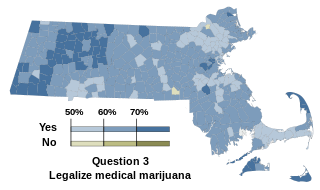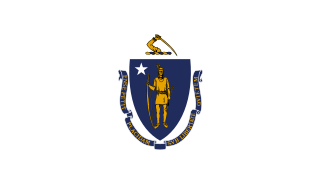
Sunderland is a town in Franklin County, Massachusetts, United States, part of the Pioneer Valley. The population was 3,684 at the 2010 census. It is part of the Springfield, Massachusetts Metropolitan Statistical Area.
Carla A. Howell is an American political activist and small government advocate. She is Political Director for the national Libertarian Party. She is most known for organizing tax cut initiative petitions in Massachusetts. She spearheaded an initiative to repeal the Massachusetts state personal income tax in 2002 and again in 2008 and one to cut the state sales tax in 2010. She ran for office in Massachusetts for U.S. Senate (2000), Governor (2002), and State Auditor (1998) on the Libertarian Party ticket. She served on the staff of the Libertarian National Committee from December 2011 until June 2017.

In California, a ballot proposition can be a referendum or an initiative measure that is submitted to the electorate for a direct decision or direct vote. If passed, it can alter one or more of the articles of the Constitution of California, one or more of the 29 California Codes, or another law in the California Statutes by clarifying current or adding statute(s) or removing current statute(s).
In the politics of the United States, the process of initiatives and referendums allow citizens of many U.S. states to place new legislation on a popular ballot, or to place legislation that has recently been passed by a legislature on a ballot for a popular vote. Initiatives and referendums, along with recall elections and popular primary elections, are signature reforms of the Progressive Era; they are written into several state constitutions, particularly in the West.
Inclusionary zoning (IZ), also known as inclusionary housing, is an American term which refers to municipal and county planning ordinances that require a given share of new construction to be affordable by people with low to moderate incomes. The term inclusionary zoning indicates that these ordinances seek to counter exclusionary zoning practices, which aim to exclude low-cost housing from a municipality through the zoning code. There are variations among different inclusionary zoning programs. Firstly, they can be mandatory or voluntary. There are also variations among the set-aside requirements, affordability levels coupled with the period of control. In order to encourage engagements in these zoning programs, developers are awarded with incentives for engaging in these programs, such as density bonus, expedited approval and fee waivers.

Three citizen-initiated measures appeared on the November 4, 2008, ballot in Massachusetts.

The State Income Tax Repeal, also known as Massachusetts Question 1, was one of the 2008 ballot measures that appeared on the November 4, 2008 ballot in the U.S. state of Massachusetts. Voters were asked whether or not they approved of the proposed measure which, if it had passed, would have ended the 5.3% income tax in Massachusetts on wages, interest, dividends and capital gains. Ultimately, Massachusetts voters defeated Question 1 by a wide margin, with approximately 70% opposed versus 30% in favor.

A Massachusetts general election was held on November 8, 1994 in the Commonwealth of Massachusetts.

A Massachusetts general election was held on November 4, 1986 in the Commonwealth of Massachusetts.

The No Sales Tax for Alcohol Question, also known as Question 1, was on the November 2, 2010 ballot in Massachusetts. The measure asked voters whether or not to repeal a sales tax on alcohol sales. The ballot measure for the 2010 ballot was added after the Massachusetts State Legislature increased the sales tax in the state from 5% to 6.25% and eliminated an exemption for alcohol sold in liquor stores.

Massachusetts Question 3, filed under the name, the 3 percent Sales Tax Relief Act, appears on the November 2, 2010 ballot in the state of Massachusetts as an initiative. The measure, if enacted by voters, would reduce the state sales tax rate from 6.25 to 3 percent. The measure is being sponsored by the Alliance to Roll Back Taxes headed by Carla Howell. The measure would be enacted into a law 30 days after the election if approved by voters.

The Massachusetts "Death with Dignity" Initiative, also known as Question 2, appeared on the November 6, 2012 general election ballot in the state of Massachusetts as an indirect initiated state statute to allow physician-assisted suicide. The measure was filed with the Massachusetts Attorney General and would establish, according to those who filed the measure, an "Act Relative to Death with Dignity". The petition number for the initiative was 11-12, and was filed by Michael Clarke as "An Initiative Petition for an Act Relative to Death with Dignity".

The Massachusetts Medical Marijuana Initiative, appeared as the third question on the state's 2012 ballot as an indirect initiated state statute. The measure allows cannabis to be used for medical purposes in the state. The initiative—backed by the American Civil Liberties Union, the Massachusetts Patient Advocacy Alliance, and the Committee for Compassionate Medicine—was filed with proponents turning in the required signatures to the Massachusetts Attorney General's office by the August 3, 2011 deadline. Those signatures were needed for the required ten qualified voters who submitted the original petition to put forward the full text of the law they want enacted. The initiative passed with support from 63% of state voters.

The Massachusetts Automatic Gas Tax Increase Repeal Initiative, Question 1 was on the November 4, 2014 statewide ballot. Approved by voters, the measure repeals a 2013 law that would automatically adjust gas taxes according to inflation, allowing for automatic annual increases in the state's gas tax.

The Massachusetts Expand Slot Machine Gaming Initiative was a 2016 Massachusetts ballot measure. Also known as Question 1, it was an indirect initiated state statute question that would allow the Massachusetts Gaming Commission to issue an additional license for another slot machine parlor to exist in the state. The ballot question specified that the additional slots parlor be licensed only on a property within 1,500 feet (460 m) of a racetrack and built on a parcel that is at least 4 acres (1.6 ha) in size. The only location in the state where this would have applied was Suffolk Downs in East Boston.
Measure S, originally known as the Neighborhood Integrity Initiative, was considered by voters in the city of Los Angeles in the March 7, 2017, election. It would have imposed a two-year moratorium on development projects seeking variances from some aspects of the city's zoning code, made changes to the environmental impact statement requirements in the code, and required the city to update its comprehensive plan during the moratorium. The measure failed, with over two-thirds of those who voted on it voting against it.

The Massachusetts general election held on November 5, 2002, included three ballot measures that were voted on by the public.

Three ballot measures were certified for the November 6, 2018, general election in the state of Massachusetts.

California state elections in 2018 were held on Tuesday, November 6, 2018, with the primary elections being held on June 5, 2018. Voters elected one member to the United States Senate, 53 members to the United States House of Representatives, all eight state constitutional offices, all four members to the Board of Equalization, 20 members to the California State Senate, and all 80 members to the California State Assembly, among other elected offices.






